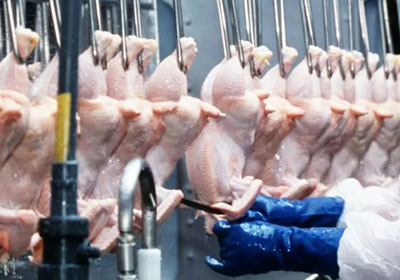by WorldTribune Staff, July 10, 2023
U.S. chicken is banned in the European Union because it is washed with chlorine.

Consuming chlorine itself is not what the EU is worried about. In 2005 the European Food Safety Authority said that “exposure to chlorite residues arising from treated poultry carcasses would be of no safety concern.” Chlorine-rinsed bagged salads are common in the UK and other countries in the EU.
The EU does believe, reports say, that relying on a chlorine rinse at the end of the meat production process could be a way of compensating for poor hygiene standards — such as dirty or crowded abattoirs or slaughterhouses.
Most U.S. corn is banned in much of the world because it is sprayed with atrazine, which, based on animal feeding studies, has been classified as a “possible” cancer-causing agent.
“It’s almost as if the FDA and U.S. food industry want their citizens fat, sick and dying,” engineer Jason Premo wrote in a July 7 LinkedIn analysis.
“And frankly, that’s what most of us are based on data from CDC regarding obesity, diabetes, and other disease with strong correlation to personal diet and lifestyle.”
Premo listed other categories of food products that are available for consumption in the U.S. that are generally banned in Europe and much of the rest of the world:
• Hormone-treated beef: The EU bans the import of hormone-treated beef. The EU argues that hormone residues in beef might affect human health, causing things like developmental issues, cancer, and endocrine disruption.
• Genetically Modified Organisms (GMOs): While not completely banned, the EU has much stricter regulations concerning the importation, production, and sale of GMOs compared to the United States. There is strong public opposition to GMOs in many European countries, leading to stringent controls and labeling requirements. Some genetically modified crops, particularly certain types of corn and soy, are grown widely in the U.S. but face significant restrictions in the EU.
• Ractopamine in pork: Ractopamine is a growth stimulant used to make meat leaner. While it is used in the U.S., it is banned in the EU because of concerns about human consumption and animal welfare.
• Food dyes and artificial preservatives: Some food dyes and preservatives that are allowed in the U.S., such as certain azo dyes (like Yellow No. 5 and Red No. 40) and the preservative BHA (Butylated Hydroxyanisole), are either banned or heavily regulated in the EU due to concerns about health effects such as hyperactivity in children or potential carcinogenic properties.
• Brominated Vegetable Oil (BVO): BVO is used in the U.S. in some citrus-flavored soft drinks as an emulsifier, but it is banned in the EU due to potential health risks. BVO contains bromine, a heavy element associated with organ damage and potential behavioral issues.
“Large food companies spend tens of millions of dollars to lobby congress, make large campaign donations, and even fund ‘research studies’ at the FDA and CDC,” Premo noted. “In the United States, the best (only?) way to find out about food industry lobbying is to check the Open Secrets website. It takes some exploration to find what you might be looking for, but it’s worth the trouble for this kind of result.”
Membership . . . . Intelligence . . . . Publish
